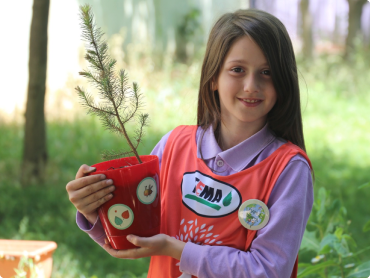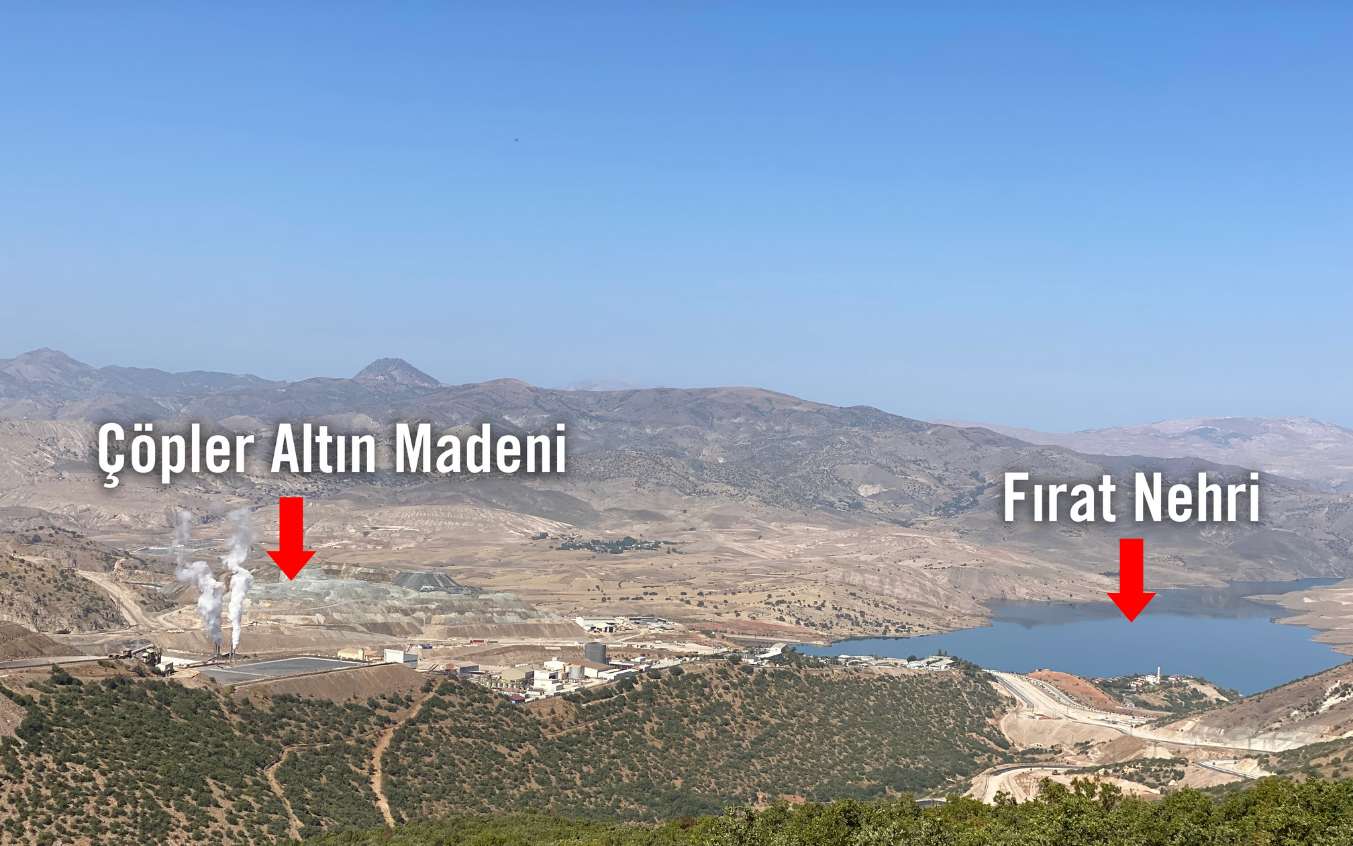TEMA Foundation drew attention to the destruction caused by Group 4 mining activities in Türkiye. Regarding the disaster in the gold mine in Erzincan, the Foundation stated, "We regret to state that this is not an accident, the disaster happened with eyes open." The Foundation reiterated its demand to limit the areas where mining operations can be conducted by law.
Mine workers were trapped underground due to a collapse that occurred in Çöpler Gold Mine in İliç district of Erzincan province on February 13. With the collapse, millions of cubic meters of soil containing numerous toxic chemicals, especially cyanide, were mixed into the Euphrates Basin.
As a result of the explosion of the cyanide solution pipe in the same mining area on June 21, 2022, tons of chemicals were spread into the environment. For this reason, the mining company was fined, and its activities were temporarily suspended.
Stating that the fine imposed on the company is not a measure, Ms. Deniz Ataç, Chairperson of the Board of Directors said, "It has not been shared with the public which measures have been taken for public and environmental health against the dangers posed by the mine."
Deniz Ataç said that what happened has once again revealed what the wild mining operations carried out in our country has caused great destruction to our lives, land, water and air, and stated, “We would like to regretfully state that what happened in İliç is not an accident or fate. After the previous disaster, we saw with great pain that adequate measures were not taken for public and environmental health, that science and the best interest of the public were ignored, and how great dangers wild mining poses."
“Positive decisions made without adequate examination are an invitation for these tragedies”
Providing information about the history of the mine, Deniz Ataç said, “As it is known, construction works at Çöpler Gold Mine started in 2009 and capacity has been increased 4 times since 2010, the time it started its operations. On 07.10.2021, Environmental Impact Assessment (EIA) positive decisions were made for the 'Çöpler Complex Mine 2nd Capacity Increase and Flotation Facility' project, and on 16.08.2023, ‘EIA Not Required’ decisions were made for the 'Çöpler Complex Open Pit Expansion' project. These permits, which are granted to the endless growth demands of wild mining operation without sufficient examination, are approvals for the danger faced by the Euphrates Basin and the increase in pressure on the ecosystem, and are an invitation to the disaster we are experiencing. One of the important facts ignored when granting these permits is that Erzincan is an earthquake zone. Earthquakes to hit will cause major environmental disasters caused by tailings dams, heap leaching and other mining."
There have been 8 publicly known mining disasters in Türkiye in the last decade
"Unfortunately, the disaster we experienced on February 13 is not the first," said Ataç, reminding that there have been 8 publicly known mining disasters in Türkiye in the last 10 years, including İliç, and added: "Between 2021-2024; mining-related environmental disasters occurred in Artvin-Murgul (January, 2021), Balıkesir-Ayvalık (January, 2021), Giresun-Şebinkarahisar (November, 2021), Balıkesir-Ayvalık (December, 2021), Mersin-Toroslar (January, 2022), Manisa-Gördes (March, 2022), Erzincan-İliç (June, 2022) and Erzincan-İliç (February, 2024). In addition, the collapse of the wall of the tailings dam belonging to the mining operation operating in Şebinkarahisar was recorded as a major environmental disaster. Due to thousands of tons of toxic chemical-containing mining waste, the Kelkit Plain and the local people, especially the water resources of the region, have faced a great threat."
EIA applications continue to increase rapidly
On the other hand, stating that EIA applications regarding Group IV. mining activities continue to increase rapidly, Ataç said, “Only in 2023, there are 525 projects for which the EIA process has started, 443 projects for which the EIA Not Required decision has been made, and 37 projects for which the EIA positive decision has been made regarding oil, natural gas, Group III and IV mines.” Ataç stated, “There is only 1 project for which a negative EIA decision was made. As can be seen, more and more mining projects are getting approval with EIA positive and EIA not required decisions every day. It is seen that all these EIA reports were developed without an effective and cumulative impact assessment and without sufficient field studies. It is observed that the principles of science, nature and best interest of the public are not prioritised in these assessments."
Cyanide and sulfuric acid can cause abnormal births and fatal diseases
Referring to the effects of the leaching method, which is applied especially in gold mining with the use of various toxic substances such as sulfuric acid or cyanide, Ataç said, “The chemicals used during leaching also release heavy metals such as arsenic, antimony, cadmium, lead, mercury and zinc in the soil and transform them into harmful forms. These toxic metals accumulate in the living body through inhalation and nutrition and can cause many diseases, including fatal cases. Acute and chronic poisoning, anemia, heart failure, cancer, kidney failure, mental illnesses and abnormal births can be seen in all living things due to cyanide and other heavy metals taken into the body through inhalation, consumption of water and food."
If the law does not protect, the mine will not allow people to survive!
Stating that "Wild mining, which poses unavoidable risks for the environment and human health, should end, and heap leaching methods using toxic chemicals such as cyanide and sulfuric acid should be banned." Ataç said, "Unfortunately, our legislation does not contain any preventive, restrictive, or protective measures to prevent this situation and eliminate this threat. On the contrary, it allows mining operations to be carried out everywhere. There is only one way to eliminate this threat, protect the ecosystem and ensure the sustainability of life, and that is to determine areas where mining cannot be done and to protect them by law.” She repeated the Foundation's demand by stating “Because we know that if the law does not protect, the mine will not allow people to survive."
Our minds and hearts are with our workers who are trapped underground
Ataç said, “We maintain our hope that our mining workers, who are struggling to survive under millions of tons of chemical waste, will be rescued as soon as possible. The measures taken and/or to be taken regarding the toxic chemical-containing soil and the resulting gases must be shared with the public immediately. We demand that these operations, which cause great harm to nature and people, be terminated in order to avoid another disaster." and asked the following questions:
- In the heap leach area, there are pipelines carrying cyanide. What is the status of these lines? How much cyanide is leaking from these lines?
- Has the risk of toxic waste accumulated in a large area without an impermeable layer leaking into the aquifer system been calculated? How does rain affect this? Which measures were taken?
- Have measures been taken to prevent inhalation of toxic gases released by the disaster? Will the affected area be evacuated? How are those living in the region, those involved in search operations, and members of the press protected?
- Have the places where these gases can reach with the wind been calculated and have public health measures been taken for these areas? If so, what are these measures?
- Is there a danger of slipping in the heap leach area located above the facility? What measures have been taken?
We are raising hope! TEMA Foundation
Note to Editor:
As a result of the mining license map studies we have carried out as TEMA Foundation since 2019, we found that 67% of the surface area of our 29 provinces was licensed for Group IV mines. 93% of Gümüşhane, 92% of Kütahya, 85% of Giresun, 82% of Rize, 80% of Uşak, 79% of Çanakkale-Balıkesir (Mount Ida), 77% of Trabzon, 74% of Ordu, 72% of Zonguldak-Bartın, Artvin, 71% of Eskişehir, 70% of İzmir, Bayburt, Sivas, 65% of Tekirdağ-Kırklareli, 63% of Erzurum, 59% of Muğla, 58% of Kahramanmaraş, Afyonkarahisar, 52% of Erzincan-Tunceli, 46 % of Tokat, 38% of Karaman and 34% of Siirt-Şırnak-Batman is licensed for Group IV. mining operations. These rates also indicate the extent of the potential danger. In Türkiye, mining operations are allowed everywhere, regardless of agricultural land, forest, pasture and water resources. For the future of our living spaces, determining areas where mining operations are banned and protecting these areas by law is an urgent step to be taken.



